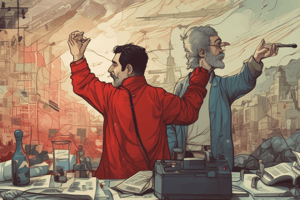Podcast
Questions and Answers
Quale concetto è associato al pensiero di Herbert Spencer riguardo alla società?
Quale concetto è associato al pensiero di Herbert Spencer riguardo alla società?
- Il rifiuto della diversità sociale
- Il concetto di organismo superorganico (correct)
- La staticità della società
- L'inefficienza del cambiamento
Quale trasformazione sociale caratterizza il periodo in cui visse Karl Marx?
Quale trasformazione sociale caratterizza il periodo in cui visse Karl Marx?
- La transizione da una società industriale a una agricola
- L'emergere della classe contadina sopraffatta
- La rivoluzione industriale e l'emergere delle fabbriche (correct)
- L'aumento della staticità lavorativa
Qual è la funzione principale dei proletari secondo Marx?
Qual è la funzione principale dei proletari secondo Marx?
- Essere proprietari delle fabbriche
- Fornire mano d'opera per la produzione (correct)
- Sviluppare competenze artistiche
- Promuovere l'agricoltura
Come descrive Marx il cambiamento nello stile di vita delle persone durante la rivoluzione industriale?
Come descrive Marx il cambiamento nello stile di vita delle persone durante la rivoluzione industriale?
Qual è il risultato della continua interazione delle diverse forme della società secondo Spencer?
Qual è il risultato della continua interazione delle diverse forme della società secondo Spencer?
Qual è il ruolo principale della radio nel contesto descritto?
Qual è il ruolo principale della radio nel contesto descritto?
Qual è la conclusione della ricerca condotta sui bambini riguardante la visione di contenuti violenti?
Qual è la conclusione della ricerca condotta sui bambini riguardante la visione di contenuti violenti?
Quale aspetto ha fatto sorgere preoccupazioni riguardanti l'industria cinematografica da parte del governo americano?
Quale aspetto ha fatto sorgere preoccupazioni riguardanti l'industria cinematografica da parte del governo americano?
In quale modo la radio e il cinema sono stati descritti nel testo?
In quale modo la radio e il cinema sono stati descritti nel testo?
Qual è un elemento fondamentale causato dalla diffusione della radio?
Qual è un elemento fondamentale causato dalla diffusione della radio?
Quale fenomeno culturale si sviluppa a causa della necessità di conformarsi per rimanere parte di un gruppo?
Quale fenomeno culturale si sviluppa a causa della necessità di conformarsi per rimanere parte di un gruppo?
In quale ambito si sposta l'alienazione secondo il pensiero di Marcuse, in un'epoca post-industriale?
In quale ambito si sposta l'alienazione secondo il pensiero di Marcuse, in un'epoca post-industriale?
Qual è uno dei contributi principali di Charles Mills alla sociologia critica?
Qual è uno dei contributi principali di Charles Mills alla sociologia critica?
Cosa osservano i sociologi riguardo ai ruoli maschili e femminili nella gestione delle dinamiche familiari?
Cosa osservano i sociologi riguardo ai ruoli maschili e femminili nella gestione delle dinamiche familiari?
Quale approccio sociologico inizia a studiare il consenso in base ai modi e alle dinamiche della cultura di massa?
Quale approccio sociologico inizia a studiare il consenso in base ai modi e alle dinamiche della cultura di massa?
Flashcards
Spencer e l'evoluzione sociale
Spencer e l'evoluzione sociale
Spencer credeva che la società fosse in continua evoluzione, passando attraverso periodi di progresso e regressione. La sociologia e il cambiamento sociale sono sinonimi, e ogni evento è sia conseguenza del passato che preludio del futuro.
Materialismo storico di Marx
Materialismo storico di Marx
Marx, influenzato dalla Rivoluzione Industriale, osservò come il cambiamento sociale fosse guidato da fattori materiali, soprattutto economici. La società, da agricola a industriale, vide l'emergere del proletariato, la cui esistenza dipendeva da un lavoro alienato e ripetitivo.
Proletariato
Proletariato
Nella società industriale di Marx, il proletariato rappresenta la classe lavoratrice che, a differenza dei contadini, lavora nelle fabbriche e riceve un salario in cambio del proprio lavoro fisico.
Rivoluzione Industriale
Rivoluzione Industriale
Signup and view all the flashcards
Organismo superorganico
Organismo superorganico
Signup and view all the flashcards
Innovazioni tecnologiche e sociologia
Innovazioni tecnologiche e sociologia
Signup and view all the flashcards
Radio come mezzo di massa
Radio come mezzo di massa
Signup and view all the flashcards
Radio, propaganda e pubblicità
Radio, propaganda e pubblicità
Signup and view all the flashcards
Cinema muto e violenza
Cinema muto e violenza
Signup and view all the flashcards
Ricerca sulla violenza nel cinema
Ricerca sulla violenza nel cinema
Signup and view all the flashcards
Influenza dei media sulle azioni
Influenza dei media sulle azioni
Signup and view all the flashcards
Osservazione partecipante
Osservazione partecipante
Signup and view all the flashcards
Trasmissione di valori (famiglia)
Trasmissione di valori (famiglia)
Signup and view all the flashcards
Alienazione post-industriale
Alienazione post-industriale
Signup and view all the flashcards
Cultura di massa
Cultura di massa
Signup and view all the flashcards
Consenso collettivo
Consenso collettivo
Signup and view all the flashcards
Sociologia Critica
Sociologia Critica
Signup and view all the flashcards
Charles Wright Mills
Charles Wright Mills
Signup and view all the flashcards
Elite al potere
Elite al potere
Signup and view all the flashcards
Study Notes
General Political Phenomena Sociology Exam (Telematic San Raffaele University, Rome)
- This exam covers general political phenomena sociology.
- The study materials are likely lecture notes.
- The material details sociological studies of power and society, with a focus on historical and philosophical context, specific theories, and critical approaches to understanding political phenomena.
- Sociologists like Montesquieu, Rousseau, Voltaire, Auguste Comte, Herbert Spencer, Karl Marx, Emile Durkheim, Vilfredo Pareto, Max Weber, Harold Lasswell, Talcott Parsons, Robert Merton, and critiques of these figures are likely included.
- The material potentially details the development of sociological thought in relation to political phenomena, including major shifts in understanding and methodology.
Sociologoy Studying Society - Power
- Sociology is objective and analytical, predicting the future.
- Evaluating reality and proposing predictions about the future are key goals.
- Sociology is connected to other disciplines like psychology and history, observing populations and everyday life.
- As reality is dynamic, sociology creates flexible interpretive frameworks.
- Theory and practice are closely intertwined in sociology.
The Birth and Development of Sociology
- Sociology emerged after a century of groundwork.
- Key revolutions (moral-religious, scientific, social) laid the groundwork.
- Gutenberg’s printing of the Bible enabled a direct connection between individuals and divinity.
- The Scientific Revolution established a new paradigm of knowledge acquisition.
- The social revolution involved social interaction, conflict, and discussion.
- The Enlightenment period empowered the individual to critique established beliefs and values.
- Early sociologists questioned the immutability of social structures and existing norms, a crucial step in the development of sociology as a field.
Three Figures Leading to Sociology
- Montesquieu: Observed diverse political systems.
- Rousseau: Developed the idea of social contract.
- Voltaire: Advocated intellectual liberty and tolerance.
From the Revolution to Sociology
- The French Revolution was a pivotal catalyst.
- The upheaval of old beliefs created a need for order and progress that spurred sociological inquiry.
- Comte's positivism marked a new phase.
Auguste Comte: Inventor of the Word "Sociology"
- Comte coined the term "sociology".
- He proposed a three-stage law of societal development.
- Believed society developed through theological, metaphysical, and positive stages.
- Used analogous scientific methods to study society.
Herbert Spencer’s Perspective on Sociology
- Spencer viewed society evolutionarily, from simple to complex.
- His perspective aligned with Darwin's evolutionary stages.
- He focused on how societies developed incrementally over time.
- He analyzed social interaction at ever-increasing levels of complexity.
Karl Marx: Materialism and Historical Context
- Marx's perspective placed a strong emphasis on historical materialism.
- He positioned societal structures within the context of economic processes and forces.
- He analyzed societal shifts from agriculture to industrialism.
- He analyzed exploitation inherent in capitalist systems.
- He explored proletarian vs. industrialist social structures and their dynamics.
Emile Durkheim: Society as a Whole and the Individual
- Durkheim advocated studying society as an objective entity.
- He argued for observation of social facts, independent of individual thoughts.
- Durkheim focused on social solidarity and studied the phenomena of religion.
- He identified types of suicide and its relation to social structure.
Vilfredo Pareto: The Psychology of Action
- Pareto analyzed actions based on rationality and irrationality.
- He described “residues” (irrational influences) and “derivations” (rationalizations for those residues).
Max Weber: Action and Interpretation
- Weber's perspective focused on the subjective meanings individuals attach to their actions.
- He emphasized the importance of cultural and religious factors.
- He developed a methodology for studying society.
The Chicago School: Lasswell's Influence
- The Chicago school stressed the importance of understanding public opinion and its influence on the political system.
- Lasswell's work on propaganda and mass communication became a key aspect.
- Emphasized analyzing mass communication's function within society.
The Chicago School: Perspectives
- Chicago school theorists studied the impact of large-scale social forces on individuals and society.
Harold Lasswell: The Role of Values
- Lasswell sought to identify and analyze the values that shape societies, and how they can influence public opinion or behaviour, particularly in the context of the emerging American mass media and political systems.
Talcott Parsons, Robert Merton, and Functionalism
- Parsons’ functionalism emphasized social order, and Merton expanded on this by analyzing the relationship between goals and means in society.
The Frankfurt School: Critical Theory
- The Frankfurt School of critical theory focused on the roles of mass media, culture, and societal structures on modern societies.
- Analyzing cultural and social factors through a critical lens.
The Sociology of Risk
- Beck's (sociologist) theories explored the socio-cultural evolution of risk.
Sociology of Time, Space, and the Individual (non-places)
- Augé addressed how modernity's changing spaces and time affected societal perception and individual experience.
Huntington's Clash of Civilizations
- Huntington proposed that cultural and religious differences would be a major source of future conflicts, especially given differing ideologies and international political pressures.
Studying That Suits You
Use AI to generate personalized quizzes and flashcards to suit your learning preferences.
Related Documents
Description
In questo quiz esplorerai i concetti sociologici di Herbert Spencer e Karl Marx, soffermandoti sulla loro visione della società e dei cambiamenti sociali. Analizzerai anche il ruolo dei media, come la radio e il cinema, nella formazione della cultura e dell'alienazione. Mettiti alla prova e scopri quanto conosci di queste importanti figure e dei loro impatti nella società moderna.




